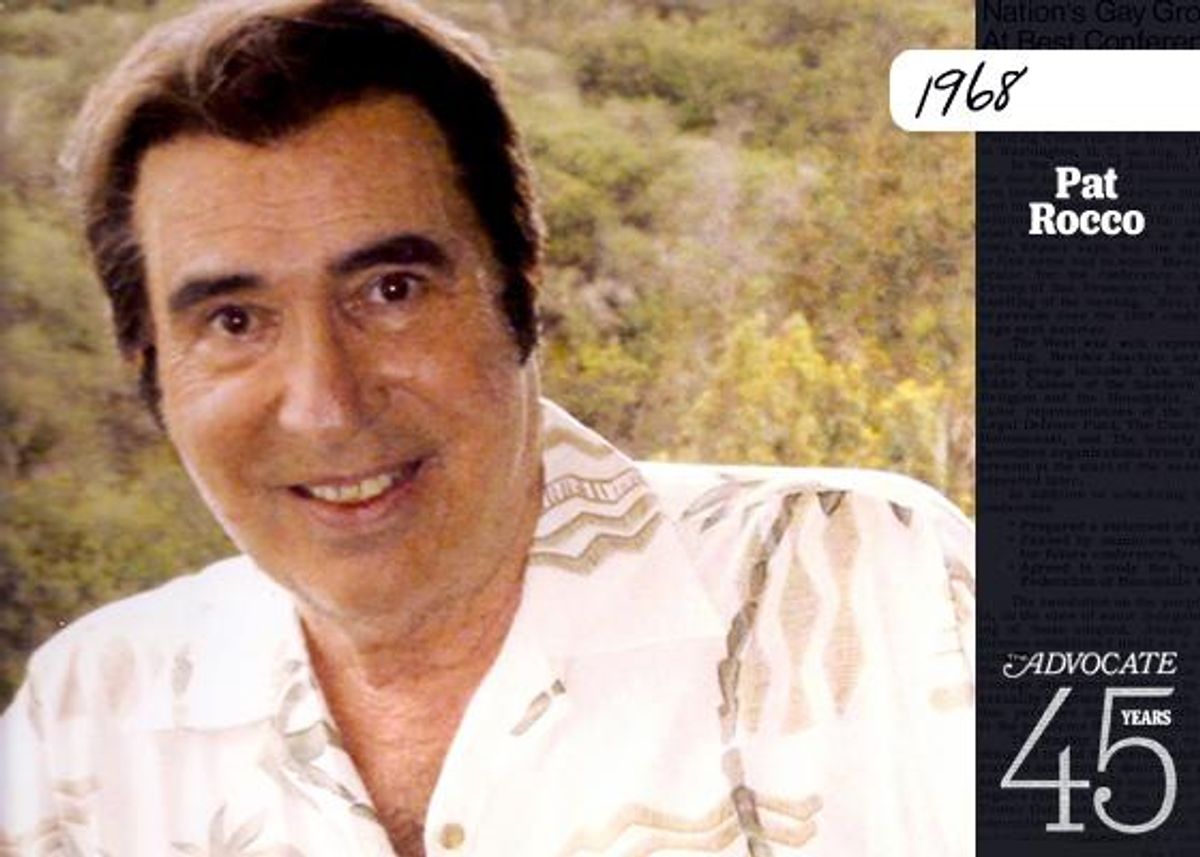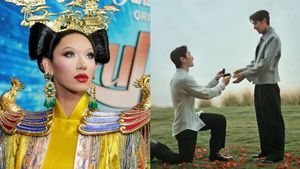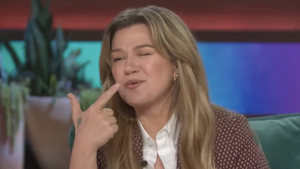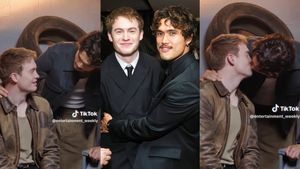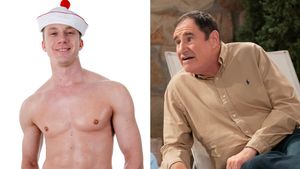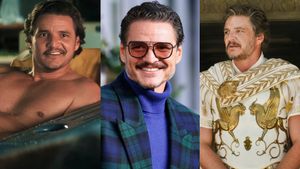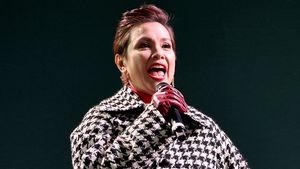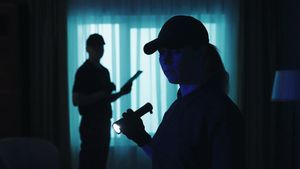While many of us associate the 1960s and 1970s with sexual liberation, mainstream films were still fairly buttoned up. But Pat Rocco made gay films when no one else dared take the risk.
His homocentric, erotic love stories and were the first films of their kind to be shown in public movie theaters.
Yet while the prolific gay beefcake photographer was defining modern male erotic film, Rocco in his spare time was documenting the fledgling gay rights movement. Rocco was behind the scenes, often working with his friends at The Los Angeles Advocate as a photographer capturing early pride festivals, rallies, and other historically important events from which images are rare. Rocco wasn't always behind the camera, though. He became the first official president of Christopher Street West Association, the organization behind Los Angeles's pride festival, and he helped launch the first festival in 1974.
--Michelle Garcia
A diva of the genre before the term "reality television" had been invented, the vivacious and lovably over-the-top Lance Loud made history when he came out as gay on the groundbreaking PBS documentary series
An American Family in 1973. An instant gay icon, Loud went on to front the new wave band the Mumps, which became a staple of Max's Kansas City and CBGBs during the clubs' heyday. With an irrepressible personality and a tendency toward performance, Loud became a contemporary of Warhol superstars Jackie Curtis and Holly Woodlawn and went on to become a celebrated columnist for the
The Advocate as well as
Details, Interview, and
Creem.Loud died in 2001, but his legacy as a pioneer and true advocate lives on. HBO's Emmy-nominated film
Cinema Verite, a behind-the-scenes look at
An American Family, premiered in 2011 and starred Diane Lane, James Gandolfini, Tim Robbins, and Thomas Dekker as Lance, whose coming-out figured prominently in the film.
--Tracy E. GilchristWhen Harvey Milk was assassinated, it was Dianne Feinstein who found his body. She announced to the public that he and San Francisco mayor George Moscone had been killed by former city supervisor Dan White.
"There was a bullet hole through Harvey," Feinstein told
The Advocate in 1998, describing the horrific scene she discovered. "I put my finger on his wrist to try to get a pulse. I knew he was dead. It was a terrible, terrible moment."
Feinstein, who took over for Moscone as San Francisco mayor in 1978, memorably eulogized both of the fallen leaders. Then she set about calming and uniting the city after White was given a light sentence and riots broke out.
The tragedy changed the course of her life, and Feinstein went on to become one of the LGBT community's strongest allies. She is now California's senior U.S. senator and was among the few, for example, to oppose the Defense of Marriage Act when it was proposed in 1996. Feinstein has introduced the Respect for Marriage Act, which would repeal DOMA if passed by Congress.
-- Lucas GrindleyJust as AIDS began to ravage New York City in 1981, Sheryl Lee Ralph starred in the original production of the Broadway smash
Dreamgirls. That time in her life would be formative, as she watched many of her gay friends succumb to AIDS. Ralph soon became one of the earliest celebrity HIV activists, with her work chronicled in a 1983 edition of
The Advocate. The actress -- who would move on to roles in
Moesha and
Barbershop -- has raised millions for HIV charities through her DIVA Foundation and her Divas Simply Singing events. While many have turned their back on AIDS-related work, Ralph continues to shout from the rooftops.
"A young man called me up yesterday to say, 'Miss Ralph, you told me to take the test ... and I'm positive,'" Ralph told us recently. "That call has never changed over 30 years -- the same fear, the same apprehension."
--Neal BrovermanSir Ian McKellen came out as gay at age 49, in 1988, while debating on a radio show. McKellen and other, were fighting to stop legislation called Section 28 from becoming law in the United Kingdom. It prohibited the "promotion of homosexuality" through gay-themed books, films, and artwork in libraries and schools. It passed in Parliament but was repealed in 2003.
McKellen went on to help found the British LGBT rights group Stonewall UK. He regularly visits schools when asked to advise on how to handle antigay bullying. And he sometimes talks to students during the visits and reflects on his years as an actor and activist. If he tells the story of coming out, McKellen might describe it as he did once in a newspaper op-ed about Section 28. "A bit late in the day, but it remains the best thing I ever did," he wrote.
--Josh Hinkle
For any liberal person following politics in the early 1990s, Republican U.S. senator Jesse Helms was center stage as the villain, fighting against many liberal causes including the National Endowment for the Arts. Despite the North Carolinian's looming presence, and over his protest, the U.S. Senate confirmed Roberta Achtenberg as the highest-ranking openly gay person to serve in any presidential administration up to that time.
President Bill Clinton nominated her in 1993 as the assistant secretary for fair housing and equal opportunity in the Department of Housing and Urban Development. Helms launched an intense campaign against Helms, even calling her a "damn lesbian" who had a vendetta against the Boy Scouts, because she was part of a group that condemned the organization for not admitting gay and bisexual members. Prior to her confirmation, the Christian Action Network distributed videos to each senator, showing Achtenberg and her partner, Mary Morgan, embracing at a gay pride parade. Eventually, however, Achtenberg was approved with a 58-31 vote. She later moved up to senior adviseor to HUD secretary Henry Cisneros.
Achtenberg's roots are in California, where she now serves on the board of trustees of the California State University system and as a director of the Bank of San Francisco and the San Francisco-based software company Andrew J. Wong Inc. Previously, Achtenberg was a senior policy adviser for the San Francisco Chamber of Commerce and the San Francisco Center for Economic Development, and was on the San Francisco Board of Supervisors. She also practiced law with Equal Rights Advocates and was a founder of the National Center for Lesbian Rights. In 2011, Achtenberg was appointed by another president -- Barack Obama -- to serve on the U.S. Commission on Civil Rights.
--Michelle Garcia1998 is the year that the name Matthew Shepard became synonymous with the consequences of unchecked hatred. The cover of
The Advocate declared, "His murder leaves blood on the hands of the the Far Right."
Shepard, beaten and left for dead the night of October 6 because he was gay, was found the next day in a remote spot outside Laramie, Wyo., and he died October 12. Aaron McKinney and accomplice Russell Henderson were convicted of the crime and are serving prison sentences. During the trial, McKinney used a "gay panic" defense, claiming Shepard came on to him and that triggered the violence, putting his antigay bias unashamedly on public display.
It wasn't until 2009 that Congress finally passed and President Obama signed the Matthew Shepard and James Byrd Jr. Hate Crimes Prevention Act that made what McKinney and Henderson did a federal crime.
The president gave Shepard's mother a kiss on the cheek after signing the bill, saying, "I promised Judy Shepard when she saw me in the Oval Office that this day would come." She and her husband, Dennis, had fought a long fight to pass inclusive hate-crimes legislation in honor of their son and to protect those like him.
--Lucas GrindleyWhen V. Gene Robinson became the first openly gay bishop in the Episcopal Church in 2003, he hoped to bring people on the margins back into the church. He could not have known that his example of what it means to be both Christian and gay would inspire a wave of LGBT people of faith to live openly and with pride.
After he became bishop, the church threatened to split apart over the election. Robinson held forums at Episcopal churches all over the country so people who were uncomfortable or angry could ask questions. But Robinson's ascension to bishop set off a conversation about the role of LGBT people in all churches, not just his own. All the while, through heated debate and repeated death threats, Robinson insisted he was doing God's work.
"As long as I've got the attention of the world's media," Robinson told
The Advocate in 2003, "I'm going to use it for the church and I'm going to use it for God."
--Lucas GrindleyDustin Lance Black writes about people who have changed the world and manages to change it all over again.
Black won an Academy Award in 2008 for Best Original Screenplay after his biopic
Milk reminded the world of Harvey Milk's perseverance on behalf of LGBT people and his assassination for trying. Black also wrote a screenplay about Pedro Zamora, who changed opinions of the MTV generation by sharing his experiences as an HIV-positive gay man in a reality show.
Now Black is a founding board member for the American Foundation for Equal Rights, which is challenging California's Proposition 8 as unconstitutional. Black wrote a play, called
8, about what happened as LGBT activists fought the law in court. A cadre of Hollywood's brightest stars joined in readings in New York and Los Angeles, and now the show is headed to states where same-sex marriage bans are on the ballot. As before, Black's work has taken something too few people had noticed and given it a bigger stage.
--Lucas Grindley